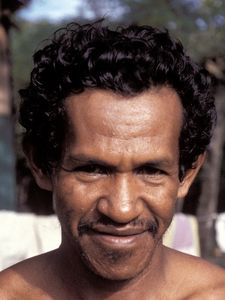 The Kaili Unde live in the mountainous western side of Palu Bay in Central Sulawesi. Some of the Kaili Unde also inhabit the southern part of Donggala and across the mountains to the coast.
The Kaili Unde live in the mountainous western side of Palu Bay in Central Sulawesi. Some of the Kaili Unde also inhabit the southern part of Donggala and across the mountains to the coast.
The word unde means “no.” The Kaili Unde language is part of a larger language group called the Kaili subfamily which also includes the Baras, Kaili Ledo and Lindu languages.
What are their lives like?
The Kaili Unde villages are small. The houses are typically on stilts. The coastal Kaili Unde practice hillside agriculture. They also have copra, cacao and palm plantations. Several also earn their living as traders, and others as small scale fishermen.
Family is very important to the Kaili Unde. They give great honor and obedience to their parents and elders. Decisions are always made by the family as a whole, and are based on traditions handed down by their ancestors.
When a child turns 12, there is a ceremony called Nokeso or Noloso. This ceremony is very important because at this time the young person begins his or her life as an adult. The young person is then given the title Toniasa which comes from the words tona (person) and nipaka asa (made an adult).
Marriage arrangements are a mix of Islamic and traditional influences. The family of the bride determines the bride price according to the social status of the girl. Marriage between first cousins is permitted among the Kaili Unde. Even though polygamy is allowed, it rarely takes place. After marriage, the couple usually lives with one of their families until they have a child.
Lalove is a flute-like musical instrument which is played to accompany the Balia (the traditional shaman). According to their beliefs, the lalove should not be blown arbitrarily, because the people who hear it could become possessed. Only the Bule (special blowers) are allowed to blow Lalove. Lalove is very important in healing ceremonies. At this ceremony, the dancer is usually possessed. This ceremony usually begins at night and sometimes continues through the next afternoon.
What are their beliefs?
Most of the Kaili Unde are devout Muslim. They believe they will be judged by their understanding of the Qur’an (Muslim holy book) and their way of life.
The Kaili Unde people have merged traditional animistic beliefs with Islamic teachings. Many still seek the help of a dukun (shaman/healer) to prevent sickness or to exorcise evil spirits. When a new house is built, the Kaili Unde always give gifts to the good and evil spirits. The bigger the building, the bigger the gift needed.
What are their needs?
The Kaili Unde people need assistance to increase the quality and quantity of their crops as well as help in marketing the produce. Formal education in schools as well as exposure to new appropriate technologies could increase their employment opportunities and help them in the development of their local economy.
Leave a Reply